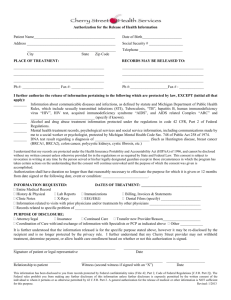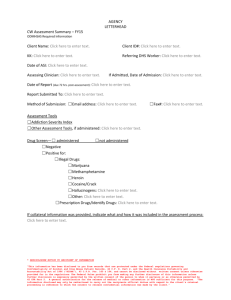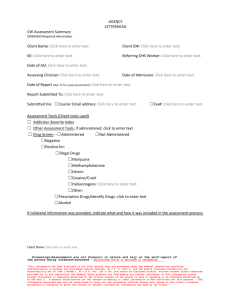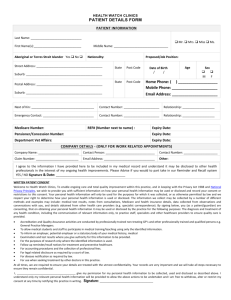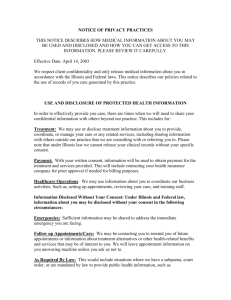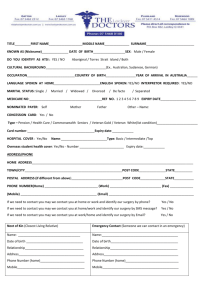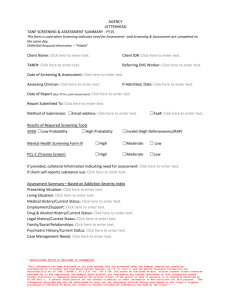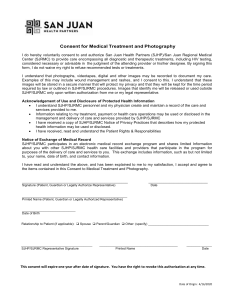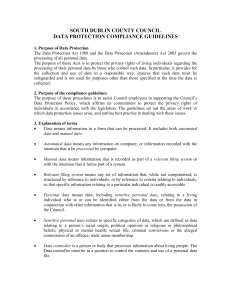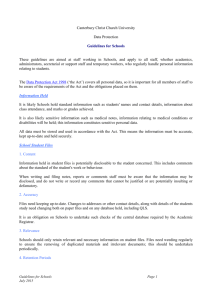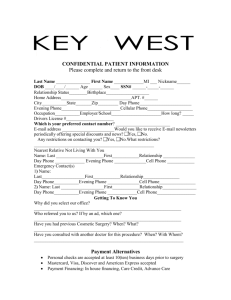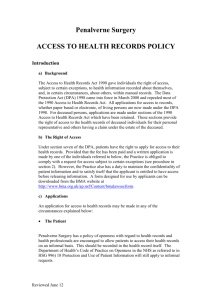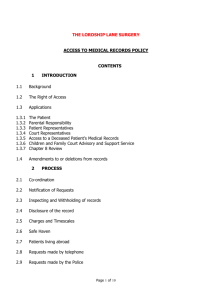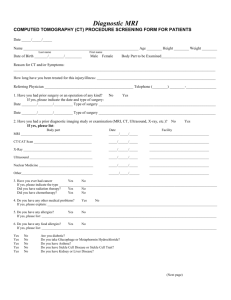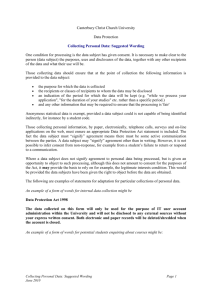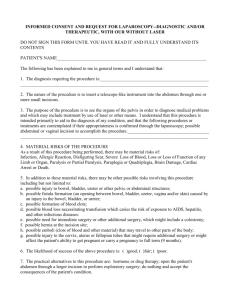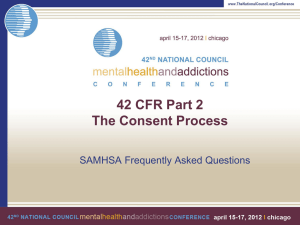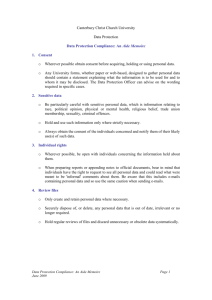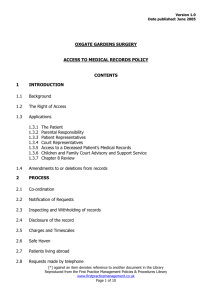THE DISCLOSURE OF MEDICAL INFORMATION
advertisement
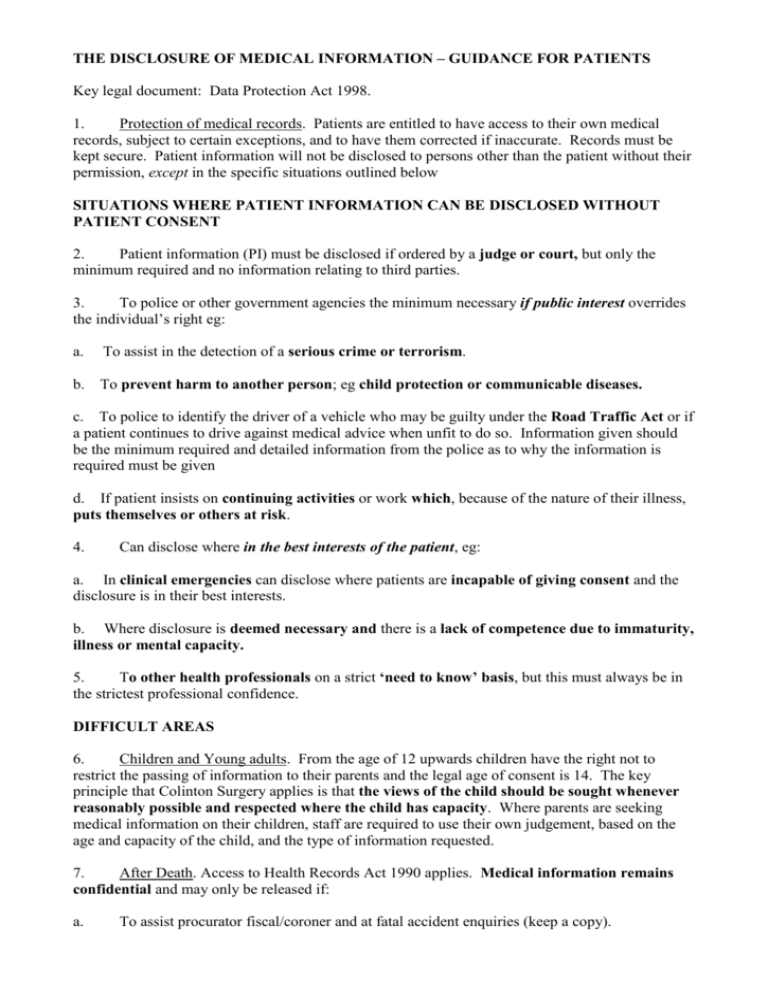
THE DISCLOSURE OF MEDICAL INFORMATION – GUIDANCE FOR PATIENTS Key legal document: Data Protection Act 1998. 1. Protection of medical records. Patients are entitled to have access to their own medical records, subject to certain exceptions, and to have them corrected if inaccurate. Records must be kept secure. Patient information will not be disclosed to persons other than the patient without their permission, except in the specific situations outlined below SITUATIONS WHERE PATIENT INFORMATION CAN BE DISCLOSED WITHOUT PATIENT CONSENT 2. Patient information (PI) must be disclosed if ordered by a judge or court, but only the minimum required and no information relating to third parties. 3. To police or other government agencies the minimum necessary if public interest overrides the individual’s right eg: a. To assist in the detection of a serious crime or terrorism. b. To prevent harm to another person; eg child protection or communicable diseases. c. To police to identify the driver of a vehicle who may be guilty under the Road Traffic Act or if a patient continues to drive against medical advice when unfit to do so. Information given should be the minimum required and detailed information from the police as to why the information is required must be given d. If patient insists on continuing activities or work which, because of the nature of their illness, puts themselves or others at risk. 4. Can disclose where in the best interests of the patient, eg: a. In clinical emergencies can disclose where patients are incapable of giving consent and the disclosure is in their best interests. b. Where disclosure is deemed necessary and there is a lack of competence due to immaturity, illness or mental capacity. 5. To other health professionals on a strict ‘need to know’ basis, but this must always be in the strictest professional confidence. DIFFICULT AREAS 6. Children and Young adults. From the age of 12 upwards children have the right not to restrict the passing of information to their parents and the legal age of consent is 14. The key principle that Colinton Surgery applies is that the views of the child should be sought whenever reasonably possible and respected where the child has capacity. Where parents are seeking medical information on their children, staff are required to use their own judgement, based on the age and capacity of the child, and the type of information requested. 7. After Death. Access to Health Records Act 1990 applies. Medical information remains confidential and may only be released if: a. To assist procurator fiscal/coroner and at fatal accident enquiries (keep a copy). b. To anyone who has a claim arising out of the death of a patient. c. On receipt of a mandate from the deceased’s personal representative. Note: If the deceased had indicated that certain information within the records was not to be disclosed and this is noted in the medical record, this information should not be released. 8. Clinical research studies, audits etc. Patient information should only be used if it can be guaranteed to be anonymous. PRACTICAL APPLICATIONS AT COLINTON 9. Collection of letters/medical notes at the front desk by third parties. Letters can be collected by persons other than the patient, but this will be in a sealed envelope. It is the responsibility of the collector to ensure that it is passed unopened to the patient. Staff have a responsibility to ensure that this is the case, and if unsure, your request to collect on behalf of a patient may be declined. 10. Collection of prescriptions at the front desk by third parties. Prescriptions can be collected by persons other than the patient, but the collector must give full details of the patient to the receptionist before collection is approved. Colinton Surgery offers a service to deliver prescriptions to most local pharmacies and all patients are encouraged to contact the surgery to request that this is set up. 11. Telephone requests for results by a third party. Results will not be given to third parties unless explicit consent, either verbally or in writinghas been given from the patient. Where children’s results are involved the guidance at paragraph 6 will be applied. 12. Medical Reports/Copies of notes etc for non NHS organisations. Information will only be released with the written consent of the patient. Any sensitive information relating to other persons in the notes will be blanked out. Key message: The confidentiality of your personal medical information is extremely important to us and we must adhere to strict protocols. Please do not be offended if some requests for information are declined until the explicit consent of the patient is obtained.
